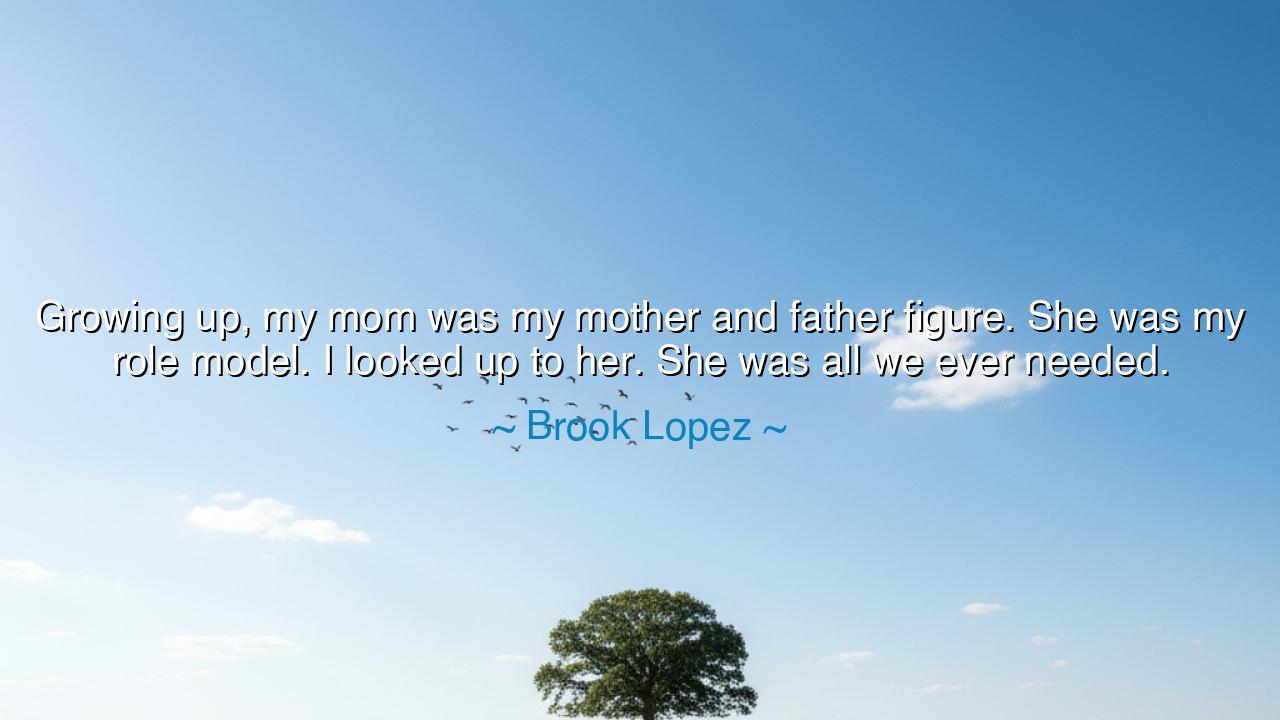
Growing up, my mom was my mother and father figure. She was my
Growing up, my mom was my mother and father figure. She was my role model. I looked up to her. She was all we ever needed.






In the words of Brook Lopez, we hear the timeless song of gratitude: “Growing up, my mom was my mother and father figure. She was my role model. I looked up to her. She was all we ever needed.” These words are not merely the memories of a son, but the testimony of a heart shaped by love and sacrifice. For in them shines a truth older than kingdoms: that a parent’s strength, even when alone, can build a fortress strong enough to shelter an entire family.
The ancients knew the power of such devotion. In their tales, when fathers fell or vanished, it was often the mother who bore the double burden—nurturer and protector, gentle hand and iron shield. To be both mother and father is no simple task; it is a trial by fire. Yet from such trials emerge figures of greatness, remembered not for what they lacked, but for what they gave. Lopez’s remembrance honors this eternal archetype: the solitary guardian who stood unwavering, whose example became the guiding star for her children.
We see this truth echoed in the story of Cornelia, mother of the Gracchi, in ancient Rome. Widowed young, she raised her sons alone, instilling in them courage, eloquence, and compassion. When asked once why she adorned herself so simply, she pointed to her children and declared, “These are my jewels.” Her legacy was not wealth but the greatness of the sons she raised, who became champions of the Roman people. So too does Lopez honor his mother as both treasure and crown—the one who provided not only bread but also vision, not only shelter but also hope.
Another example shines in the life of Abraham Lincoln, whose father was present but distant, and whose mother died early. It was his stepmother, Sarah Bush Lincoln, who gave him warmth and encouragement. She taught him kindness, believed in his mind, and nurtured his will. Lincoln would later say that all he was, or ever hoped to be, he owed to her. In this we see the same truth Lopez describes: that the presence of a loving and determined mother can shape the destiny of a child more than any title or position.
The lesson is clear: honor the sacrifices of those who raised you, especially those who bore burdens alone. To be both mother and father requires courage beyond measure, yet it is often done quietly, without applause, without rest. Children who are blessed with such guardians must not forget their debt. Gratitude is not only words—it is living in such a way that their sacrifices are vindicated, their labor not in vain.
Practically, this means looking upon those who raised us with reverence, not resentment. It means carrying forward their teachings, embodying the virtues they lived, and when possible, lightening their load in return. It also means recognizing single parents in our communities—not as figures of pity, but as heroes who deserve support, respect, and honor. For in their strength lies the quiet continuation of civilization itself.
And so, Brook Lopez’s words become more than memory; they become a call to action. They remind us that a role model need not be perfect, nor surrounded by wealth or ease. A true role model is one who shows unwavering love, who gives what they can until it becomes enough, who becomes the safe place, the strong hand, the guiding voice. Such a figure is, indeed, “all we ever needed.”






AAdministratorAdministrator
Welcome, honored guests. Please leave a comment, we will respond soon